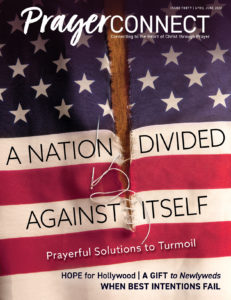Truths to Remember
How to Pray When a Nation Is in Turmoil
By David Kubal
 “It just makes my blood boil.”
“It just makes my blood boil.”
These are the words I heard coming out of my own mouth at a prayer event—in front of a bunch of people—when I described the latest political “breaking news.” I can’t remember if I had ever used that phrase before, but something hit me as the last syllable left my mouth. I think it was the Holy Spirit.
I began to ask myself questions. Why are you so mad? Who are you so mad at? Are you supposed to be mad? My first thought was that I am absolutely supposed to be mad. After all, the Bible talks about “righteous anger,” and God gets angry: “God is a just judge, and God is angry with the wicked every day” (Ps. 7:11, nkjv). I am demonstrating a character of God by being mad at the evildoers, right?
I momentarily felt a little godlier. This should have been my first clue something wasn’t right. The Holy Spirit quickly brought to my attention Colossians 3:8: “Now you must also rid yourselves of all such things as these: anger, rage, malice. . . .”
The Spirit reminded me that anger is reserved for God.
Leave Anger to God
So, it appears God reserves the right to judge and be angry at the wicked, and we are to get rid of anger toward them. Initially, this conclusion seemed wrong because I wanted to be furious with people who are doing terrible things in our nation.
Then, I believe, the Lord spoke to my heart, saying, “Dave, I will be the Judge. Leave the anger to Me. These people are lost and deceived. Do you remember when you were lost and deceived? These people on the news shows who are constantly lying and showing their anger toward righteousness were created by Me, and I have godly plans and purposes for them in My heart.”
To be honest, I shouted back, “But do You know how terrible these people are?” Even as I type these words, I am laughing at myself.
Holding onto anger against someone for their unrighteous acts gets us nowhere. It just makes us bitter. Bitterness has been defined as swallowing poison and expecting the other person to die. God doesn’t want our lives filled with the poison of anger and bitterness.
Today’s anger and bitterness have been fueled by “identity politics,” political strategies to divide people into groups, such as evangelicals or liberals or white or black or brown or gay or straight. This is a well-known political strategy championed by Saul Alinksy in Rules for Radicals.
After causing division, each group tries to convince people that the other groups are against them. Angry spokespeople then go to news stations, polling booths, and courts to fight for their “rights.” The result is a divided nation full of people who speak of tolerance, but are, in reality, intolerant and angry.
Purpose and Destiny
The very people I want to be angry with are individuals like me, created in God’s image, created with purpose, created with a destiny. But they have not yet found the purpose and destiny God has designed for them. As I watch them on TV and try to adopt that perspective, I have actually begun to forgive them. And forgiveness releases me from anger.
The Church has a great opportunity, summed up in three prayer points.
1. Pray prayers resulting in peace. Paul says in 1 Timothy 2:1–2, “I urge, then, first of all, that petitions, prayers, intercession and thanksgiving be made for all people—for kings and all those in authority, that we may live peaceful and quiet lives in all godliness and holiness” (emphasis added). These verses guide our prayers and actions. They remind us of our primary prayer priority and give us an outcome to pursue. We are to first pray for our government leaders so that we can live peaceful, godly, holy lives.
How often do we give this matter the priority God gives it? Most prayer times start with requests about someone’s health or a family’s wayward child. Then the prayers usually turn to church programs and the pastor. Rarely is the very first prayer about government leaders.
If we think this primary prayer priority is challenging today, keep in mind that the emperor of Rome when Paul wrote this letter to Timothy was Nero! At the time, Nero was executing Christians in horrible ways—for sport. He even set fire to Christians to light his garden parties. Yet Paul exhorted Timothy, and all Christians, to pray for Nero and other civil authorities.
The primary pursued outcome of this prayer, according to this passage, is for us to lead quiet and peaceful lives. This is a reference to religious freedoms. We desire the freedom to walk with God and live our lives the way we believe we should without government interference. But we dare not expect revival to come from government. The solution is not a pastor in the Oval Office. And we should never mix nationalism with Christianity.
Government is a separate institution, created by God to care for our civil lives. When government takes on the role of the Church, we slip into socialism, where citizens trust in government—and not God—to care for them.
2. Pray prayers reflecting God’s sovereignty. Psalm 2:1–5 declares, “Why do the nations conspire and the peoples plot in vain? The kings of the earth rise up and the rulers band together against the Lord and against his anointed. . . . The One enthroned in heaven laughs; the Lord scoffs at them. He rebukes them in his anger and terrifies them in his wrath.”
Remember, ultimately the course of our nation is up to God. He is sovereign. Yet, I hear from many people so deeply burdened with the state of this nation that their thoughts are consumed with worry, they lose sleep, and their health suffers.
God will have His way. That is certain. But His sovereignty does not absolve us of our responsibility to pray, vote, and be involved in our communities.
When we understand God’s sovereignty, we have peace, and our civil engagement can be a joyful act of obedience instead of a desperate attempt to save our nation before we lose it.
3. Pray prayers of praise. The psalmist writes, “May the peoples praise you, God; may all the peoples praise you. May the nations be glad and sing for joy, for you rule the peoples with equity and guide the nations of the earth. May the peoples praise you, God; may all the peoples praise you. The land yields its harvest; God, our God, blesses us” (Ps. 67:3–6). These verses directly connect God’s blessing to our praises.
Isn’t that true in our relationships, too? When our children constantly have their hands out, expecting cash or car keys, we question whether giving to them is a good thing. But how willing we are to bless our children when they express gratitude!
A nation that expresses gratitude on a large scale will be blessed by God. We, as the Church, have the opportunity to lead the way, for who else understands gratitude better than lost souls regenerated through the grace of God?
Peace in the Toxicity
Some news commentators say we are on the verge of another civil war—with anger spilling into the streets, igniting violence. Do we want to be consumed by such a toxic elixir that initially feels good, then poisons us with overwhelming bitterness?
We can’t afford to let anything make our blood boil. God wants us to get rid of anger, remain levelheaded, and pray prayers of peace—all the while praising His sovereignty and His provision. He is our peace.
DAVID KUBAL is president and CEO of Intercessors for America, a ministry in the Washington, D.C., area that mobilizes intercessors to pray for national, state, and local concerns.
 Article from Prayer Connect Issue 40, “A Nation Divided Against Itself.” To subscribe to Prayer Connect click here.
Article from Prayer Connect Issue 40, “A Nation Divided Against Itself.” To subscribe to Prayer Connect click here.